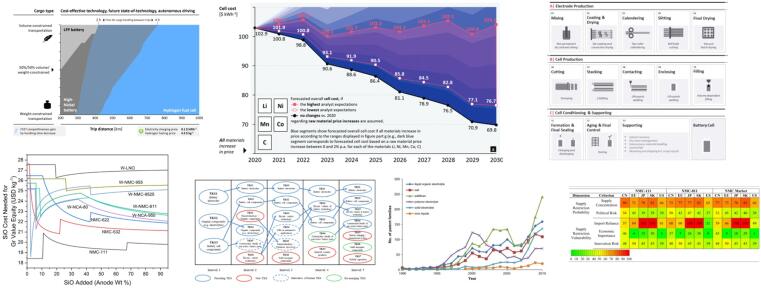
Elektrochemische Energiespeichertechnik
Das Team der Wirtschaftschemie komplementiert die Stärke Münsters als international führender Standort für Batterieforschung. Unser interdisziplinäres Team entwickelt neue Methoden zur Berechnung von Batteriekosten, der Skalierung der Batterieproduktion und der systematischen Analyse von Trends in der Grundlagenforschung und industriellen Entwicklung neuer Batterietechnologien.
Ein Fokus unserer Arbeit liegt auf der Entwicklung von Modellen zur ökonomischen Bewertung von Batterien und einzelner Komponenten.[1,2] Ergebnisse unserer Forschung haben beispielsweise neue Erkenntnisse zur zukünftigen Entwicklung von Batteriekosten [3] und Kosten in der Großproduktion von Batterien [4] geliefert.
Darüber hinaus hat unser Team Kompetenzen im Bereich der Analyse zukünftiger Batterietechnologien entwickelt.[5,6] Diese Untersuchungen haben beispielsweise neue Erkenntnisse in der Anwendung von maschinellem Lernen zur Analyse von Entwicklungstrends [7] und der effektiven Technologiewahl für batteriebetriebene Großfahrzeuge [8] geliefert.
Ein weiterer Fokus unserer Forschung liegt in der Untersuchung von Produktionsinfrastruktur und Standortentscheidungen für neue Batteriefabriken, sowie der Analyse von Lieferketten.[9, 10, 11]
[1] Mauler, L., Lou, X., Duffner, F., & Leker, J. (2022). Technological innovation vs. tightening raw material markets: falling battery costs put at risk. Energy Advances, 1(3), 136-145.
[2] Greenwood, M., Wentker, M., & Leker, J. (2021). A bottom-up performance and cost assessment of lithium-ion battery pouch cells utilizing nickel-rich cathode active materials and silicon-graphite composite anodes. Journal of Power Sources Advances, 9, 100055.
[3] Mauler, L., Duffner, F., Zeier, W. G., & Leker, J. (2021). Battery cost forecasting: a review of methods and results with an outlook to 2050. Energy & Environmental Science, 14(9), 4712-4739.
[4] Duffner, F., Mauler, L., Wentker, M., Leker, J., & Winter, M. (2021). Large-scale automotive battery cell manufacturing: Analyzing strategic and operational effects on manufacturing costs. International Journal of Production Economics, 232, 107982.
[5] Wagner, R., Preschitschek, N., Passerini, S., Leker, J., & Winter, M. (2013). Current research trends and prospects among the various materials and designs used in lithium-based batteries. Journal of Applied Electrochemistry, 43, 481-496.
[6] Greenwood, M., Wrogemann, J. M., Schmuch, R., Jang, H., Winter, M., & Leker, J. (2022). The Battery Component Readiness Level (BC-RL) framework: A technology-specific development framework. Journal of Power Sources Advances, 14, 100089.
[7] Aaldering, L. J., Leker, J., & Song, C. H. (2019). Analysis of technological knowledge stock and prediction of its future development potential: The case of lithium-ion batteries. Journal of Cleaner Production, 223, 301-311.
[8] Mauler, L., Dahrendorf, L., Duffner, F., Winter, M., & Leker, J. (2022). Cost-effective technology choice in a decarbonized and diversified long-haul truck transportation sector: A US case study. Journal of Energy Storage, 46, 103891.
[9] Duffner, F., Kronemeyer, N., Tübke, J., Leker, J., Winter, M., & Schmuch, R. (2021). Post-lithium-ion battery cell production and its compatibility with lithium-ion cell production infrastructure. Nature Energy, 6(2), 123-134.
[10] Duffner, F., Kraetzig, O., & Leker, J. (2020). Battery plant location considering the balance between knowledge and cost: A comparative study of the EU-28 countries. Journal of Cleaner Production, 264, 121428.
[11] Greenwood, M., Wentker, M., & Leker, J. (2021). A region-specific raw material and lithium-ion battery criticality methodology with an assessment of NMC cathode technology. Applied Energy, 302, 117512.

